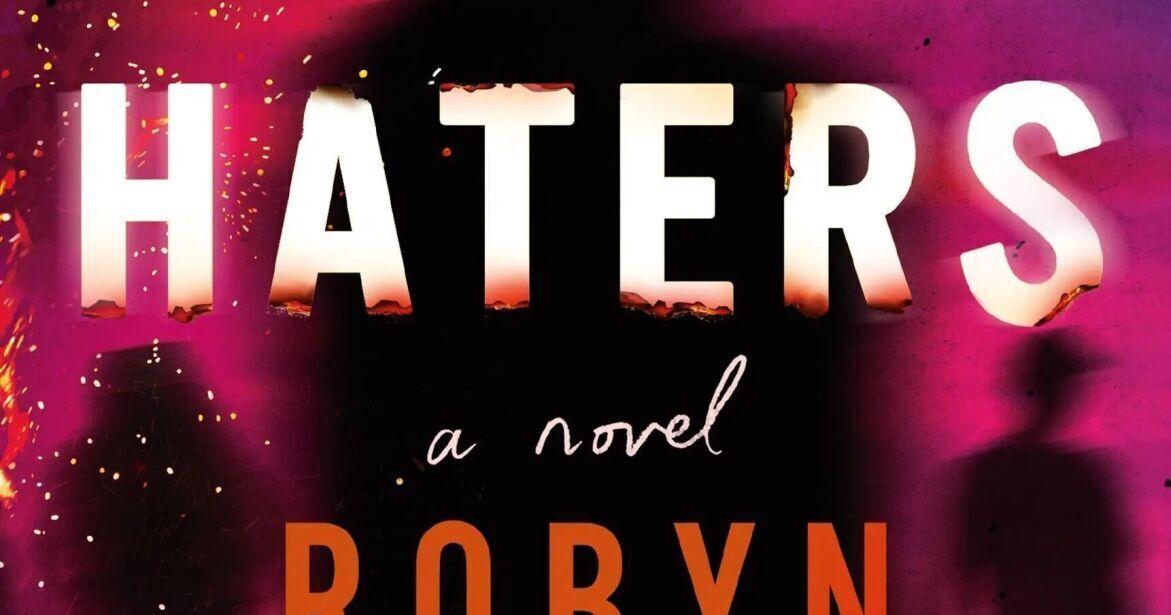
Proverbial life lessons abound in “The Haters,” Robyn Harding’s wonderfully improbable page-turner of a thriller.
“Look before you leap,” for instance. And “Don’t jump to conclusions.” “Keep your friends close and your enemies closer” is in there, too.
More specific to Camryn Lane, the novel’s woman-in-peril, the lesson might be, “After you recover from your divorce, write the novel you’d always dreamed of, get a six-figure deal and a review in the New York Times (‘a brave new voice in fiction’), and then begin to accrue bad reviews online that progress to being nasty and wholly unfounded ad hominem attacks that then escalate so quickly and so much that there’s eventually a murder. Take some comfort in Maya Angelou: ‘You may not control all the events that happen to you, but you can decide not to be reduced by them.’”
As “The Haters” opens, Camryn seems on track for total happiness. For this introverted “human house cat” in Vancouver, there’s a handsome younger boyfriend, a novel that’s been on bookstore shelves for two days and is supported by an entire publicity team, a meaningful job as a high school counsellor, enthused colleagues and a well-adjusted daughter about to finish high school.
True, there’s Fiona Carmichael, the school’s mean girl who is “pure evil.” But she’ll graduate soon and become a problem for someone else.
Soon, though, a pesky online review accuses Camryn of exploiting her “vulnerable public school students to make a few bucks.”
(While wholly unnecessary to the plot, Harding includes a handful of ludicrous excerpts from Camryn’s “Burnt Orchid,” which traces the rise of Orchid Carder, who resides with her mother “above a chicken shop,” plunges a knife into the belly of her mother’s predatory boyfriend and, eventually, creates “an empire on the meanest streets of L.A.” — all before she becomes the first lady of Chicago!)
After a book festival heckling incident in Florida, the online reviews grow increasingly vitriolic — “Camryn Lane is no better than a child abuser, using and exploiting the young people in her care” — and prolific to the point that Lane’s own publicity department throws in the towel.
She’s stung, naturally, and hurt. Plus, confounded by the negativity. The outpouring of hatred and its intensity seems awfully personal.
In a tailspin, Camryn arrives at the deranged spot where suspiciousness meets paranoia. Is “Ingrid Wandry,” who spearheads the online torches-and-pitchforks crowd, really a persona dreamed up by her jealous boyfriend? And what about her closest friend? Or that friend’s unstable husband? And how about that woman (also jealous) from her writers’ group? Or maybe her ex or his haughty new wife? And what’s up with the sneaky boyfriend of her daughter? And her daughter’s been acting a bit strangely too, hasn’t she?
Camryn hatches plans and takes ill-advised actions. They backfire. Mostly, she illustrates how she would not be the last woman standing in a horror flick.
With short, smoothly plotted chapters, Harding (“The Perfect Family”) displays an effortless mastery at beguiling readers with a superabundance of suspects. She’s a whiz too at ratcheting up the tension. Whodunnit, whodunnit, we’re compelled to know.
Who did do it? Well, Camryn is right about one thing. The attacks are personal.






